|
|
|
Sort Order |
|
|
|
Items / Page
|
|
|
|
|
|
|
| Srl | Item |
| 1 |
ID:
160814
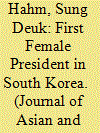

|
|
|
|
|
| Summary/Abstract |
When Park Geun-hye was elected South Korea’s first female president in 2012, many expected that South Korea’s democracy would deepen. Contrary to the expectation, however, from the beginning of her administration, there were concerns about democracy retreating due to her leadership style/qualities. Despite her rather “undemocratic” leadership qualities, Park Geun-hye has consistently received 30% or higher job approval ratings until “Choi Soon-sil gate” broke out in October 2016. Thus, in this study, we analyzed what led to her leadership qualities and makes it possible for her to maintain a relatively high level of job approval ratings. We argue that her leadership qualities are the product of her unique personal background and South Korea’s immature democratic institutions. She receives relatively strong support thanks to her father, President Park Chung-hee’s (1961–1979) legacy.
|
|
|
|
|
|
|
|
|
|
|
|
|
|
|
|
| 2 |
ID:
130706
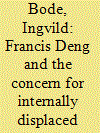

|
|
|
|
|
| Publication |
2014.
|
| Summary/Abstract |
Using the case of Francis Deng as representative of the Secretary-General for internally displaced persons as an example, this article considers how temporary civil servants may become intellectual leaders within the United Nations. During his 1992-2004 tenure, Deng managed to raise assistance and protection expectations for the internally displaced through framing their concerns in the concept of sovereignty as responsibility. He also contributed to legal change through formulating protection and assistance standards-the Guiding Principles on Internal Displacement. The article argues that a combination of three factors enabled him to exercise intellectual leadership. First, his insider-outsider position at the border between the UN Secretariat (the second UN) and the nongovernmental organizations, academic scholars, and independent experts who engage regularly with the UN (the third UN); second, his personal qualities; and third, his effective ways of framing at an opportune moment in time.
|
|
|
|
|
|
|
|
|
|
|
|
|
|
|
|
| 3 |
ID:
124508
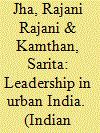

|
|
|
|
|
| Publication |
2012.
|
| Summary/Abstract |
The role of urban political leadership, crucial thought, it has lately underwent a tremendous expansion and change in the wake of globalization and adoption of neo-liberal economic policies, by the Government of India, the 74th Amendment act 1992 and the introduction of Jawaharlal Nehru Urban Renewal Mission -JNNURM 2005-2006, etc. The leader in the changing city scenario is meeting newer challenges every other day. Whether the competence and character of the emerging leadership matches or not with this expanding role requirement of the urban political leader becomes a vital issue which needs to be addressed urgently. The present article make a modest attempt in this direction on the basis of a study of the emerging political leadership in the city of Allahabad.
|
|
|
|
|
|
|
|
|
|
|
|
|
|
|
|
| 4 |
ID:
105366
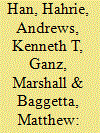

|
|
|
|
|
| Publication |
2011.
|
| Summary/Abstract |
Member-based civic associations, or citizen groups, have two crucial roles in American democracy. They advocate for members' interests in the public arena, but also operate as Tocquevillian "schools of democracy" linking citizens to politics and equipping them with the skills of democratic citizenship. Yet scant research has examined the interrelationships of these two roles. Does the work that civic associations do in developing democratic participants enhance the work they do advocating for members' interests in the public arena? We bring together two previously disparate strands of research on civic associations by arguing that a key factor affecting the political presence of civic associations is leadership quality. We focus on the relationship of leadership quality to political presence, using data from a unique 2003 study of 226 local entities of the Sierra Club. We show that organizations with more skilled and committed leaders have higher levels of political presence. This contrasts with previous research that has focused primarily on community context and resources as explanatory factors. This study shows that political presence is related to the extent to which leaders develop their skills and demonstrate commitment to the organization.
|
|
|
|
|
|
|
|
|
|
|
|
|
|
|
|
| 5 |
ID:
133074
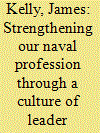

|
|
|
|
|
| Publication |
2014.
|
| Summary/Abstract |
W ho are the leaders in our Navy? If "four star admirals" is the response, that is the wrong answer.* The right answer is: every Sailor, insofar as he or she is responsible for other Sailors, is a leader in our great Navy.† From the most junior enlisted personnel to the most senior officers, all are a part of the leadership equation. Junior enlisted personnel need to be recognized as prospective leaders who have the potential for strategic impact through their performance-not as folks "who just follow orders"-just as senior officers are called on to be bold and decisive leaders with the responsibilities of promoting and safeguarding the morale of those under their command. Indeed, all Sailors must understand that we-individually and collectively as the Navy Team-are accountable for the welfare of our shipmates, no matter our respective ranks.
|
|
|
|
|
|
|
|
|
|
|
|
|
|
|
|
|
|
|
|
|